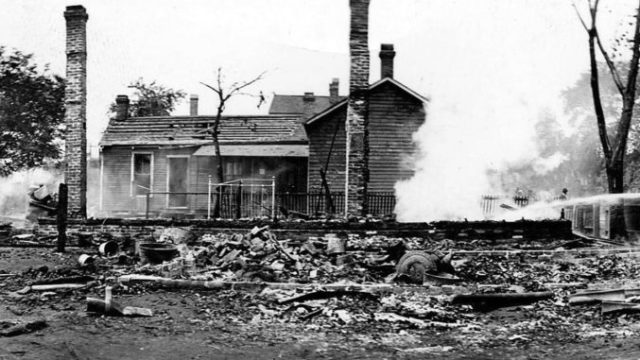
By Stacy M. Brown
BlackPressUSA
The National Association for the Advancement of Colored People – NAACP – was founded 110 years ago after a deadly race riot rocked the city of Springfield, Illinois. “Because of the riots in Springfield, that brought about serious conversations and meetings about starting an organization, a national organization, that would try to address racial issues,” said Nell Clay, Springfield and central Illinois African American History Museum president.
The Springfield race riots took place in August of 1908.
Today, the NAACP remains the foremost civil rights organization in the world with an overriding mission: equality for all.
“There were two African Americans in jail, one accused of rape and one accused of murder,” Clay said. “A mob came to the jail to do their own justice by lynching the individuals.”
Several lives were lost and property was destroyed during the race riot. But at the time, there had been race riots throughout the nation, according to the local Fox affiliate near Chicago.
So why did the Springfield race riots lead to the formation of the NAACP? “Because Springfield was the land of Lincoln – the individual that freed the slaves,” Clay said. “Maybe there was a thought that this was a great place for African Americans to live.”
Once the riots were over, discussions began for a necessary organization.
“People got together around the country, especially throughout Illinois, and said again enough is enough. You need to meet and form an organization that will deal with race in America because race riots were unacceptable,” said Teresa Haley, president of the Illinois NAACP chapter.
Several scholars officially founded the NAACP in New York on February 12, 1909.
Throughout its history, the NAACP has fought to meet the objectives of people of color and have kept to their main goals and principles including:
- To ensure the political, educational, social, and economic equality of all citizens
- To achieve equality of rights and eliminate race prejudice among the citizens of the United States
- To remove all barriers of racial discrimination through democratic processes
- To seek enactment and enforcement of federal, state, and local laws securing civil rights
- To inform the public of the adverse effects of racial discrimination and to seek its elimination
- To educate persons as to their constitutional rights and to take all lawful action to secure the exercise thereof, and to take any other lawful action in furtherance of these objectives, consistent with the NAACP’s Articles of Incorporation and this Constitution.
- During its 110th anniversary observance, the NAACP has recognized its founders.
- Founding member William Walling authored, “The Race War in the North,” an article detailing the Springfield race riot.
- Founding member W.E.B. Du Bois served as the NAACP director of publicity and research from 1910-1934, and was a member of the board of directors, and founder and editor of “The Crisis Magazine,” which continues to serve as a source of news and information from an African American perspective.
- In her years at the NAACP Rosa Parks worked specifically as a criminal justice and sexual assault investigator. In 1944 she lead the investigation into the rape of Recy Taylor.
- Founding member Ida B. Wells was an investigative journalist and educator. A pioneer in the anti-lynching movement, Wells dedicated much of her life’s work to the cause and published extensive research on the psychological implications of lynching.
Throughout the 1920s and 1930s, the NAACP led the Black civil rights struggle in fighting injustices such as the denial of voting rights, racial violence, discrimination in employment, and segregated public facilities.
From 1920 to 1950, the NAACP focused on five major areas: anti-lynching legislation, voter participation, employment, due process under the law, and education, according to the National Museum of African American History and Culture in Washington, D.C.
At yearly conventions in different cities around the country, it drew attention to regional needs and interests and encouraged nationwide participation.
Thurgood Marshall grew up in a nurturing African American community in segregated Baltimore.
After graduating from all-black Lincoln University in Pennsylvania, he enrolled in Howard University’s law school. In 1934, he began practicing law in his hometown and immediately was drawn into the local civil rights movement.
In 1938, Marshall took over the leadership of the NAACP legal team from his mentor Charles Hamilton Houston.
A year later, he established the NAACP Legal Defense and Education Fund to carry out the organization’s legal campaign. Marshall’s legal skills, his earthy wit, and easy manner made him an effective leader.
Soon after graduating from law school, Thurgood Marshall took the case of Donald Gaines Murray, an African American student seeking admission to the University of Maryland School of Law.
This case went to the state Supreme Court and successfully challenged segregated education in Maryland.
Speaking at a ceremony to commemorate the recent anniversary of the Brown v. Board of Education, which Marshall and the NAACP argued, legendary U.S. Rep. John Lewis said:
“Had there been no May 17, 1954 (the day the Supreme Court ruled in Brown V. Board of Education), I’m not sure there would have been a Little Rock. I’m not sure there would have been a Martin Luther King Jr., or Rosa Parks, had it not been for May 17, 1954. It created an environment for us to push, for us to pull,” Lewis said.
“We live in a different country, a better country, because of what happened here in 1954. And we must never forget it. We must tell the story again, over and over and over,” he said.
The NAACP’s role in the Civil Rights Movement was vital, said Maryland Democratic Congressman Elijah Cummings. “Today, the organization continues to fight for the freedom, justice, equality, educational, social, economic and political quality of all,” Cummings said.
“This vital work has created justice and opportunity for all of us today and for generations yet unborn.”




